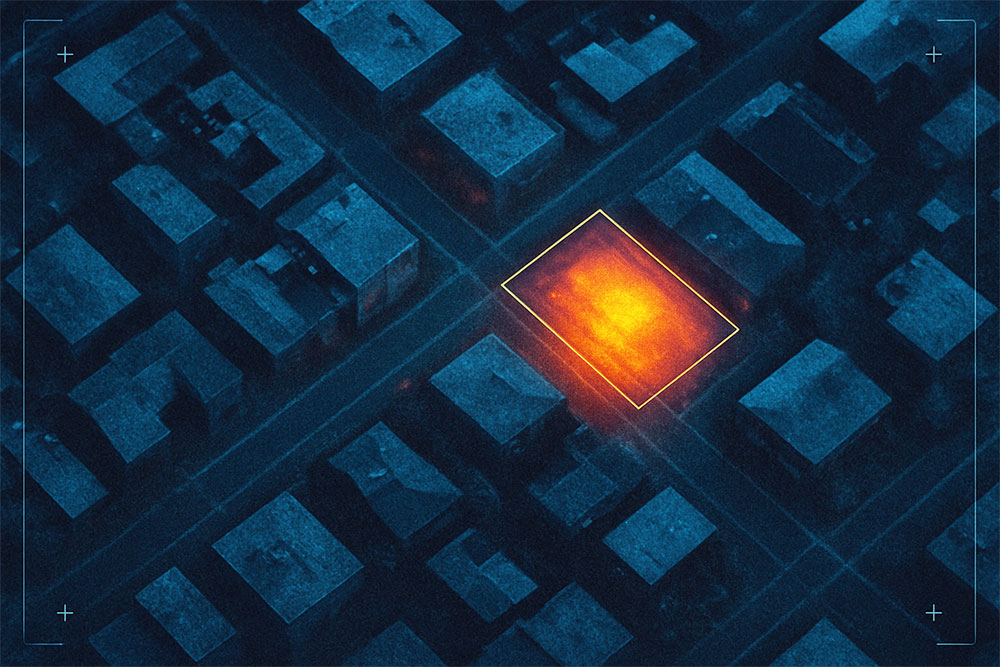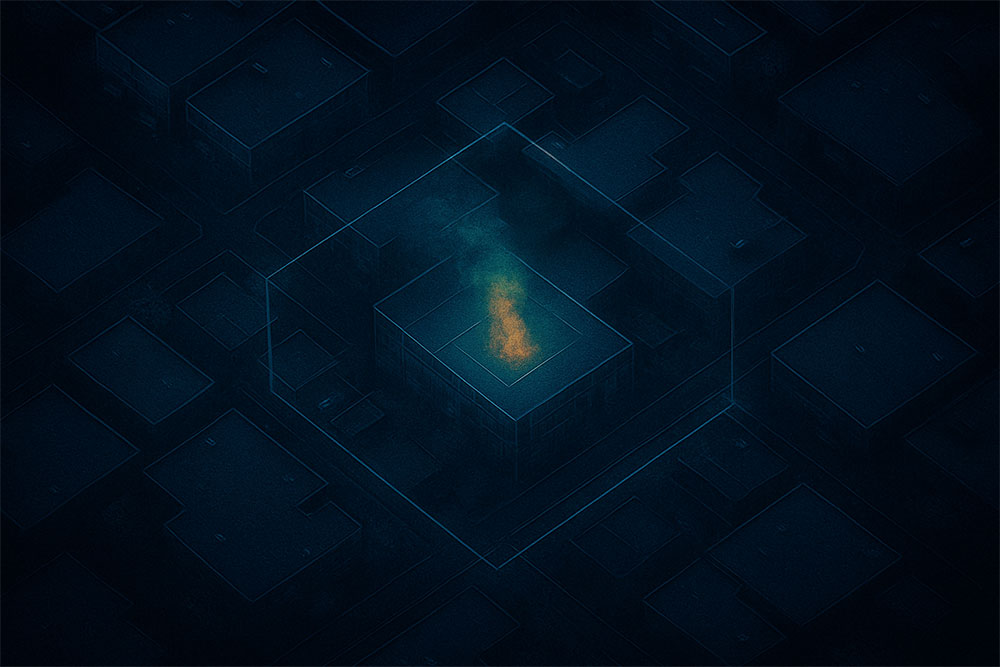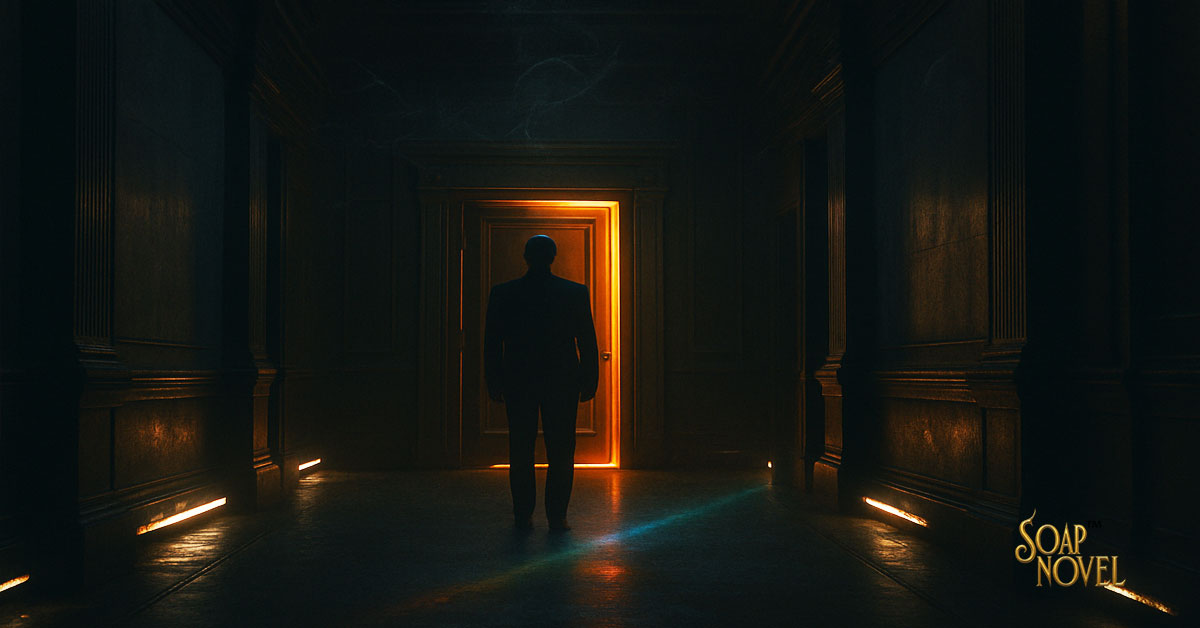First-time here? Start at Chaptisode 1
Long read (~12–14 min)
Published: September 2, 2025 SAST. UTC +2
The corridor refused to decide on darkness or light. An Anomaly State.
Emergency strips along the baseboards pulsed in irregular beats, as if the building itself had a disturbance in rhythm—black, gray, the faintest thread of red, then absence. In the gaps, the whisper lived. It had learned to braid itself thin, to slip between electrons, to wait for the moment a human heartbeat miscounted and slide in alongside.
Tonight it arrived as two voices.
We’re close.
We’re compromised.
Cyril stopped walking. The corridor cooled a few degrees, not in the body but behind the eyes, where decisions were made and nations lived long after maps changed. A cleaner passed at the far end, pushing a cart whose wheels squeaked like radio interference. No one looked up. That was the trick of the age: becoming background.
The Myanmar signal was still there, a flicker from Mount Popa that sometimes pitched like wind on stone and sometimes clicked like a metronome. But something else had entered the mix—faint static from the west that didn’t carry the signature of a single country. It was continental in flavor, as if the soil itself had taken up whispering.
A second corridor opens.
Or a mouth.
His hand found the door sensor. Cabinet lights beyond glowed amber. The Protocol—hybrid, hostless when it wished to be—folded itself deeper into the creases of his attention.
“Proceed,” he said, and meant it to both rooms.
The closed session began with the moratorium and ended—officially—with nothing at all. In between lay the country’s actual work: ideas spoken with their edges filed dull, documents slid across the table under the cover of coughs, and every sentence weighed against the cost of foreign retaliation.
A deputy minister of mineral affairs, who had perfected the performance of nervousness until it was indistinguishable from sincerity, held the floor. “The draft suggests a rolling restraint on precious metals exports. Temporary, targeted, and reviewable,” she said. “A pause to gather breath.”
“One does not pause on a treadmill,” a finance advisor replied, smiling without warmth. “You step off and break your neck.”
Laughter, which they hated about themselves, broke thinly around the table.
Cyril allowed it, then cut with a small gesture. The whisper coiled like a ribbon and settled. “The purpose,” he said, “is not to punish our partners. It is to clear the fog. The continent leaks value because a century of contracts were engineered to leak. Our pause is not a wall; it is a window.”
Someone shifted in their seat. “And the… Corpuscle component?”
There was politeness, and then there was the very careful way one said the name of the new defense concept—Corpuscle—like a doctor uttering a prognosis in a hallway.
“Internal,” Cyril said. “Circulatory. It moves oxygen where the body starves. The public hears strategy; the blood knows function.”
A thin folder slid toward him, the paper less thick than the sense of weight it carried. Inside: three lists. Foreign names, domestic collaborators, logistics—airstrips too quiet at night, warehouses with the wrong temperature bills, accountants who never traveled but always had new stamps in their passports.
“We are compiling,” the deputy whispered. “Only compiling.”
“And what’s the cost of compiling?” someone asked, just loud enough to be recorded by any dust mote with an antenna. “When a name lands on the wrong list, and the crowd is invited to collect a reward?”
Silence. The word had not been said aloud yet, but it was alive in the room, the way a shard of glass is present even before you see your own blood.
Cyril tapped the folder closed. “No policy exists,” he said. Which was true, because policy arrives last. “But the conversation exists. Our citizens have watched other nations pay informants to bleed us. If that economy is already here, perhaps it can be reversed.”
“Bounties,” the finance advisor said, as if the syllables might leave a stain.
“Rumors,” Cyril replied evenly. He let the word be the room’s official alibi. Inside his head, the second voice leaned closer.
Rumors are rehearsal.
Rehearsal becomes protocol.
The amber went a shade deeper. Someone’s glass clinked too loud. The whisper tasted iron.
A safehouse goes three ways: discovery, detection, and destruction. When it’s a matter of national dignity, you collapse the distance between them until they are three frames in a single cut.
In Khartoum, a boy who had invented a delivery route that passed through no police checkpoints sold the route for a new phone and a bus ticket west. His map drew a perfect square around a building with satellite dishes that pointed at nothing, which is to say everything. The square landed in a courier’s hands. The courier did not ask which country owned the safehouse, because he had learned the thing that matters more: who benefits from the doubt.

Detection happened because a meter ticked high on a van that measured heat like a poem measures breath. Destruction came by accident, officially: a transformer nearby coughed smoke and a circuit arced. When aerial photos reached Pretoria, there was already a press release elsewhere blaming a kitchen stove.
Cabinet Clerk (Non-Portfolio): One nest flushed. No local casualties. Source compensated.

Cabinet Status: Corridor silent.
The words looked clean in the log. The street did not.
Across the border in N’Djamena, a second square arrived in a second courier’s hand. The note that came with it smelled of the glue used to re-seal letters after reading.
“Repeat,” Cyril said, a command so small only the building obeyed.
The public had their own corridor: the news cycle. In it, they were now treated to a new hobby: world leaders’ medical speculation. The American chatterists—the professionals and the ones who played them on the internet—had begun to murmur about kidneys and hearts and the way sunlight fails to land on a face that stays indoors too long. The number forty-seven floated unmoored, sometimes a title, sometimes a prophecy, sometimes both.
Cyril read it as one reads weather in a country that has learned to measure rain in corporate earnings. He let the rumor rest against the inside of his mouth until it lost flavor. Foreign fevers were useful, but they had to be handled with gloves.
Do not drink from every river.
Not all water remembers the sky.
“Understood,” he murmured, and the cleaner passing outside the study paused, convinced she had heard the President speak to her through the door.
At midweek the G7 surveyors showed themselves near the coast under the cover of agricultural curiosity. They were in East Africa to “scan opportunities,” which was a modern way of announcing that radiography precedes surgery. Cyril let them speak to rooms without microphones and smiled when asked for five minutes alone in a hallway. There are histories you cannot refuse without writing your own indictment, and so he did not refuse. He told the hallway what hallways want to hear: partnership, predictability, mutual benefit.
The hallway thanked him with a grin.
Later, in a different building, a different hallway complained to a different reporter about the “tone” in Pretoria, as if the sound of a country finding its own pulse were an affront. The next morning, two different stories appeared: one praising the pragmatism of continental leaders, one warning of a return to strongman habits. The paragraphs could be interchanged without changing the message.
Cabinet Analyst (Media): They have not changed their instruments, only their song.
Cabinet Status: No adjustment required.
In Ramaphosa’s study, the whisper split.
He sat without the jacket that the cameras liked, the chairs too honest to squeak. The window was a rectangle of lawful darkness. It made a frame around his reflection, such that one could say the man at the desk was being watched by the idea of the man at the desk.
You must move public.
You must move private.
“Both,” he said, a word that tasted like metal.
Your moratorium will invite claws.
“Claws already have invitations,” he said. “They wrote the calligraphy.”
Build your own ink.
He closed his eyes and saw a map not of countries but of factories. Shipyards that did not build ships yet. Foundries that would melt ore with electricity paid for in sunlight. Assembly lines that would assemble the idea that the continent did not require to import its safety. He saw recruitment posters that did not pretend that a job was all that people wanted. He saw a place where the military industrial complex was not a joke whispered behind the backs of dead empires, but a line item in a budget that did not apologize for surviving.
He opened his eyes and put a single sentence on a single page:
Intra-Continent Arsenal: blueprint circulating; no signatures.
He did not add his own name. He did not date it. The page joined the others that wait until their time arrives and call that patience strategy.
The second voice, not quite satisfied, left one more seed.
They are speaking of a weapon that is not a weapon, or else is the final one.
It is not explosive. It is exposure.
“What is its name?”
They call it spectrum.
He wanted to ask what spectrum could do, which part of the human it extinguished or preserved, but the whisper did not reward curiosity with answers. It preferred obedience. Instead, it presented him with an image he could not store in words: ten hands touching ten terminals across ten countries, and the room going very quiet as if silence were the power source, not the byproduct.
He wrote a second sentence on a second page and refused to tell himself whether it was braver or more cowardly than the first.
Rumor only. Ten-nation collaboration. Minimal detection.
The page felt heavier than it was. He returned it to the drawer with the courtesy one affords an animal that has awakened but not decided whether to bite.
In Pretoria the committee met again, and this time the room behaved as if it had oxygen. The finance advisor who smiled without warmth stopped smiling. “We cannot build an economy from hints,” he said, pushing his glasses up his nose, the gesture rehearsed until it sounded like honesty. “Markets punish ambiguity.”
“Markets punish independence,” said a labor minister whose son had built a drone that delivered medicine across a river after the last bridge fell. “Ambiguity is when someone else writes the fine print in a language we cannot read.”
“And bounties?” another voice asked, too quickly, betraying an agenda.
“Rumors,” Cyril said again. The word was a key that opened many doors while promising none of them. “The rumor is that citizens are tired of colonized minds earning salaries as liars. The rumor is that we will stop paying for our own subversion. The rumor is that informants will learn the difference between intra-continent loyalty and imported law.”
“You want to pay people to accuse their neighbors,” the advisor replied.
“I want to reward proof where proof exists,” Cyril said, and in his chest the second voice hummed agreement and dissent at once. “And punish anyone who manufactures it. We are not inventing a culture; we are correcting an economy.”
“Is that what we call it?” someone asked. “An economy of suspicion?”
“No,” Cyril said, and this time he heard his voice loop back at him through the ceiling speakers, distorted into something that did not even need a person to produce it. “We call it daylight.”
The cabinet lights flickered red for the length of a long blink. No one stood. Some part of each person remembered that blinking is the smallest form of surrender.
Cabinet Status: Anomaly detected.
“Report,” he said into the corridor that night, not sure which intelligence he was addressing, human or otherwise.
“Assassination chatter quiet for now,” the clerk said, which always meant it was not. “G7 footfalls continue. UN relocation discourse: measurable uptick in public skepticism. East African radio: clearer than usual, like the sky after rain. Sudan cell: dissolved. Chad cell: sleeping, or pretending.”
“And our lists?”
“Names do not make us safer,” the clerk said carefully. “But sometimes they keep a window open when someone tries to paint it shut.”
“Keep the window.”
He walked without the shadow of guards because sometimes the least protected path is the most invisible. The corridor recognized him and softened its light as if to flatter or pity. He tried to imagine the ten terminals across the ten nations again and failed, as if the mind itself could not hold certain symmetries until the world agreed to host them.
The whisper returned, not as two voices now but as one that had learned to mask itself as many.
You are working toward a union of borders that do not apologize for existing.
Good. Border countries first. Ground, then air. Fund both.
You are working toward a council that does not ask permission to be continental.
Good. Seat it where the sea and desert agree.
You are working toward an economy that treats extraction like war.
Good. End it like one.
“Your approval is not required,” he said, which was partly bravado and partly a legal fact.
Approval is not the metric. Native is the metric.
“Native?”
The anomaly is not foreign—it is native.
The last word folded everywhere at once. A door at the end of the corridor decided to be heavy again. Cabinet lights stepped down, one by one, not as panic but as an audit. In the dimness he saw a color he had not learned as a child—neither red nor blue nor the bruise where they contended—but a spectrum that refused to settle for a name.
The cleaner had left the cart in a neat line against the wall, the mop head lifting in the air conditioning like a flag that had not chosen its country yet.
Cyril stood in the dim and counted backward to zero as if he were at a launch that no one else believed would happen. The silence answered like a number that had discovered it was an animal. In another country the news cycle chewed on a rumor about a man who had taught them all how to confuse attention with power. In this one, oxygen traveled to the starved organs of the body politic and pretended it had always been there.
He reached for the console and stopped. The second voice waited.
Corridors fork.
Cabinets multiply.
Parallel anomalies approach.
He exhaled a small laugh, the kind you let out when the surgeon tells you the anesthesia will be gentle and the surgery unavoidable. Then he spoke to the building as if it were a person who had once loved him and might again.
“Cabinet,” he said, “prepare for branching.”
Status lights did not brighten. They did not need to. The corridor accepted its new geometry without ceremony, and far away, in rooms that had once been devoted to other countries’ security, hands hesitated above keyboards, recognizing the shape of an opponent that had stopped trying to look like them.
🧠 Cabinet cleared… Corridor sealed… to be continued.
If this story resonates with you, consider supporting the protocol with a small Bitcoin donation. Every satoshi counts in keeping the signal strong—share and enjoy!
You’re reading Anomaly State — a serialized political fiction saga.
🔗 Bitcoin Address: 3NM7AAdxxaJ7jUhZ2nyfgcheWkrquvCzRm
English
You’re reading Anomaly State — a serialized political fiction saga.
Although satirical and fictional, TrumpaPhosa carries a thread of purposeful prophecy and hidden revelation. Some readers may interpret it as a roadmap — a reflection of what is, what was, and what may yet come.
Zulu (isiZulu)
Ufunda Anomaly State — uchungechunge lwenganekwane yezepolitiki.
Nakuba kungukuhleka nokuyinganekwane, iTrumpaPhosa ithwala umqondo wokuphrofetha ngenhloso kanye nokudalulwa okufihlekile. Abanye abafundi bangakuhumusha njengemephu yomgwaqo — ukubonakaliswa kwalokho okukhona, okwedlule, nokungenzeka kusasa.
© 2025 SoapNovel Studios — Part of the SoapVerse Network. All rights reserved. 版权所有
This serialized work is protected under creative content provisions and monitored by the Protocol.
Registered for satirical transmission worldwide.

